Are You Taking Your Precious Eyesight For Granted?

If you’re over 40 years old, you’ve probably started to realize that your vision just isn’t as sharp as it used to be, even if you’re wearing prescription glasses.
That’s why FabOverFifty has partnered with ZeaVision, the makers of EyePromise Vizual EDGE, to bring you valuable information on how to support your long-term eye health and feel more comfortable driving at night.
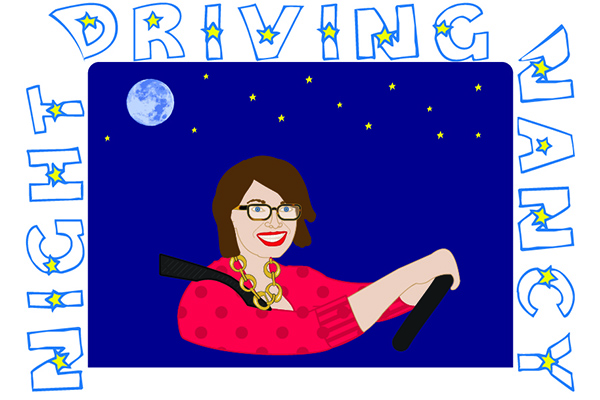
Illustration by Simone Brin
Why your vision deteriorates after 40
Changes to our eyes occur gradually, over decades, until we suddenly recognize changes in our vision. As we age, our pupils shrink and dilate less in the dark, which reduces the amount of light entering our eyes. This can even make it seem as if we’re wearing dark sunglasses at night.
We’re also at greater risk for age-related macular degeneration (AMD), the deterioration (or thinning) of the macula, a critical part of your eye responsible for your central vision. In some cases of AMD, blood vessels can form under the retina and leak blood and fluid into the eye. Macular degeneration is the leading cause of vision loss in adults over 55.
 Zeaxanthin and lutein are powerful nutrients which can help protect our eyes against further deterioration and support the natural functions of your eye. The nutrients also help protect against harsh light from glare and oncoming traffic, improve clarity and decrease eye stress.
Zeaxanthin and lutein are powerful nutrients which can help protect our eyes against further deterioration and support the natural functions of your eye. The nutrients also help protect against harsh light from glare and oncoming traffic, improve clarity and decrease eye stress.
“Zeaxanthin and lutein protect the most important retinal real estate of the eye–the macula–which allows us to see detail. It is therefore critical to maintain the quality and health of this area of retinal tissue in a modern society that depends upon using computer screens and driving automobiles safely,” said Dr. Stuart Richer, doctor of optometry.
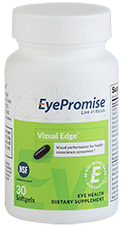
While leafy greens, certain fish, and other foods contain trace amounts of these nutrients, the amount we need to protect and improve our eye health can be found only in a supplement like EyePromise Vizual EDGE.
Learn more and give your eyes the
nutrients it needs.
![]()
Are YOU uncomfortable driving at night?
Tell us in the comments section below.
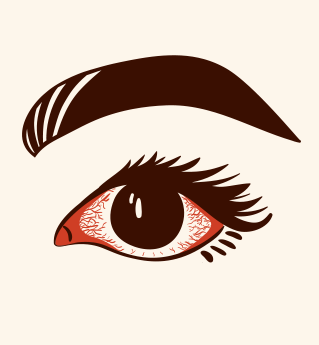
While hot flashes, loss of libido and sleeplessness always are associated with declining levels of estrogen and other hormones during menopause, occasional dry eye is another common symptom that gets little, if no, attention! Recognizing the importance of our eyes to our overall health and well being, FabOverFifty is partnering with EyePromise during Menopause Awareness Month.
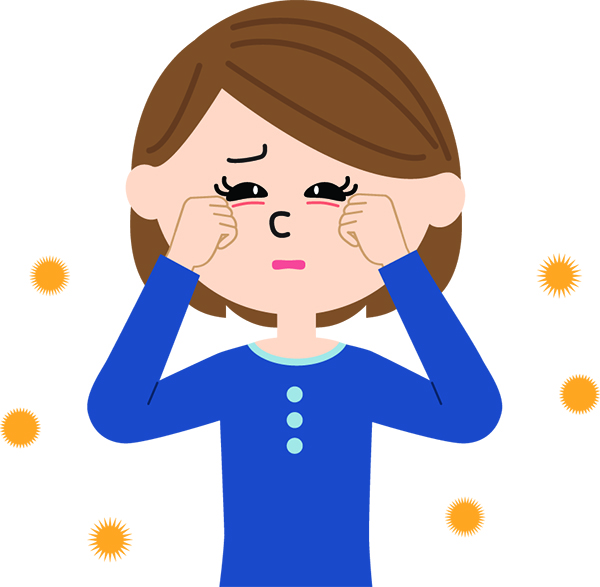 “Both men and women past the age of 50 experience increased dryness in their eyes, but the condition is nearly twice as likely to occur in women,” says Sean Mulqueeny, O.D. of Mulqueeny Eye Centers in St. Louis. “It’s a result of the decrease of the hormone androgen, which causes the eyes to lose moisture.”
“Both men and women past the age of 50 experience increased dryness in their eyes, but the condition is nearly twice as likely to occur in women,” says Sean Mulqueeny, O.D. of Mulqueeny Eye Centers in St. Louis. “It’s a result of the decrease of the hormone androgen, which causes the eyes to lose moisture.”
Geri is one of the 40% of people over 40 who feel uncomfortable driving at night. See why she avoided driving after dark, and what she did to start feeling secure again behind the wheel!
![]()
Changes to our eyes occur gradually, over decades, until we suddenly realize we simply don’t see as well as we used to. As we age, our pupils shrink and dilate less in the dark, which reduces the amount of light entering our eyes. This can even make it seem as if we’re wearing dark sunglasses at night. (more…)
One of the most important things we can do for ourselves as we age is to stay on top of the health issues that could arise. After all, “knowledge is power,” as Francis Bacon, the English philosopher, so wisely said.

February is AMD Awareness Month, and chances are, you know someone who has this common condition, but you probably don’t know much, if anything, about it. The fact is, with over 2 million Americans suffering from the disease and 7 million at risk, AMD is the leading cause of vision loss in people over 55 years old, and the number is expected to double in the next four years.

To help educate our community of exceptional women about AMD, FabOverFifty has joined the #AMDawareness campaign, sponsored by EyePromise. (more…)
Many of us think occasional dry eye is a natural part of aging, and so we do nothing about it.

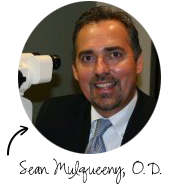
Following menopause, however, our hormone fluctuations can disrupt our eye health. FOF recently spoke with Sean Mulqueeny, O.D. of Mulqueeny Eye Centers in St. Louis, to get the low-down on the relationship between occasional dry eye and menopause.
![]()
What happens during menopause that can cause occasional dry eye?
A disruption or imbalance of hormones can lead to increased surface inflammation in all patients older than 50. While increased dryness occurs in both genders past age 50, dry eye is nearly twice as likely to occur in women. A decrease of the hormone androgen can cause your eyes to lose moisture. (more…)
 ARE YOU ONE OF THE 40% OF AMERICANS WHO SUFFER FROM OCCASIONAL DRY EYE?
ARE YOU ONE OF THE 40% OF AMERICANS WHO SUFFER FROM OCCASIONAL DRY EYE?
At one point or another, you’ve probably experienced a symptom of dry eyes, a common condition in which the tear ducts don’t produce enough tears to lubricate and nourish the eyes. Now that winter is almost here, the dry air can make our eyes even drier, and lubricating eye drops simply won’t help us produce tears more naturally (or help our eye health in the long run). Contact lenses, diabetes, rheumatoid arthritis and LASIK surgery also can affect tear production.
Dry eye symptoms include irritated, scratchy, or burning eyes; feeling that a foreign particle is in the eyes; and excess watering, blurred vision, or redness. Healthy eyes, on the other hand, are constantly bathing themselves in tears, which helps protect against eye infections, wash away foreign matter in the eye, and keep the eye surface smooth and clear. When your eyes become dry, you become more susceptible to these infections. (more…)
When we hear the word “menopause,” we usually think of night sweats, mood swings, and hot flushes, but a common health condition often goes ignored or improperly treated.

Sixty-two percent of menopausal and perimenopausal women suffer from dry eye, according to a survey conducted by the Society for Women’s Health Research.
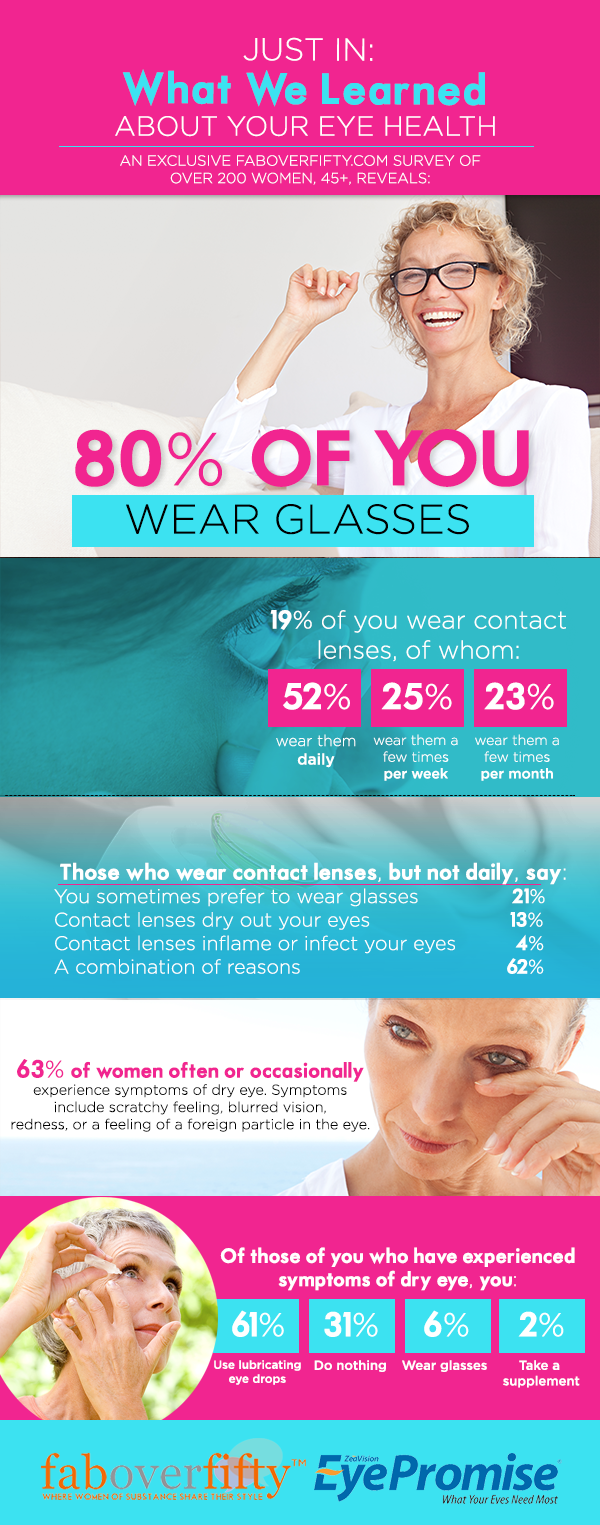
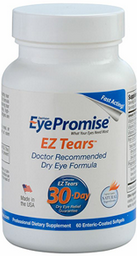
Although it is easy to pick up artificial tears or soothing drops at the drugstore, to help relieve dry eyes, they do not support long-term eye health or future protection against the condition.
As an alternative, strengthen your eye health, from within, with EyePromise EZ Tears, softgels taken orally. These doctor-recommended vitamins provide consistent comfort against dry eyes by delivering a powerful blend of vitamins A, D3, and E, as well as fish oil, Omega 3, and other natural ingredients.
Help prevent dry eyes by nourishing from within. Drop the drops and learn more here.
This post is sponsored by EyePromise, who help keep our eyes healthy. Thanks for supporting FabOverFifty!